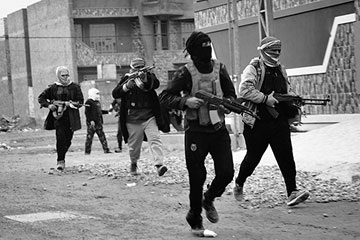
Tribal fighters patrol Fallujah streets on Jan. 5 as the Iraqi government faces off against al-Qaeda forces.
(2 of 6)
The war in Syria has made ISIS the strongest al-Qaeda franchise, says Jessica D. Lewis, director of research at the Institute for the Study of War, in Washington, and author of a recent report on al-Qaeda's resurgence in Iraq. That has made Baghdadi a target of both the Assad regime and some former allies among the rebels, resulting in battlefield losses in recent weeks. It has also made him a force for the future, if he outlasts his many enemies. Baghdadi "has taken terrain in Syria and Iraq, and he has established a government system," Lewis says. "He is the one conducting the war that all the foreign fighters are seeking. He is calling the shots, and that will make him a major player in al-Qaeda going forward."
The Ghost Rises
Baghdadi remains an enigmatic figure. Jihadist websites are full of accounts of his battlefield exploits, but surprisingly little is known about the man himself. Born Ibrahim bin 'Awad bin Ibrahim al-Badri ar-Radawi al-Husseini as-Samara'i in 1971 to a religious family in Samarra, Iraq, he claims in an online profile written by a follower to trace his lineage all the way back to the Prophet Muhammad. Abu Bakr al-Baghdadi is a nom de guerre; he also goes by Abu Du'a.
When the U.S. and its allies invaded Iraq in 2003, Baghdadi joined forces with his mentor Abu Mousab al-Zarqawi, a Jordanian militant who went on to found al-Qaeda in Iraq (AQI). Over the years, Baghdadi climbed the ranks. Zarqawi was killed in 2006, and his successor, Abu Ayyub al-Masri, died in 2010. A subsequent leader died shortly thereafter, and Baghdadi took over AQI's leadership in 2010.
Abdul Rahman Hamad, an ISIS fighter from Homs, Syria, who is recovering from injuries in a safe house in Tripoli, Lebanon, remembers meeting Baghdadi at a training camp in Diyala province in eastern Iraq in 2004, when he and hundreds of other Syrian jihadists flooded into Iraq to combat the Americans. Baghdadi seldom spoke, Hamad tells TIME, but when he did, "he had a calm and convincing voice," even in the middle of an air strike. As a commander, Baghdadi stood out for his focus on his men's safety, planning not only sophisticated attacks but also secure retreats.
Baghdadi wanted to keep himself alive too, says Hamad. Early on in the war, Baghdadi started disguising himself, wrapping a scarf around his face even in the presence of close associates. "[He] knew how men can be seduced by money, so he never shared his secrets with anyone," says Hamad. Members of Hizballah, the Lebanese Shi'ite militia fighting on behalf of Syrian President Assad against ISIS and the rebels, call him the Ghost. "Only a few people know the face of Baghdadi," says Sheik Ahmad, the Hizballah intelligence official in charge of investigating ISIS's fighters in Syria. Ahmad, who spoke to TIME on condition of not revealing his full name, says his archenemy can slip effortlessly into convincing regional accents, from Lebanese to Syrian to Saudi Arabic.
